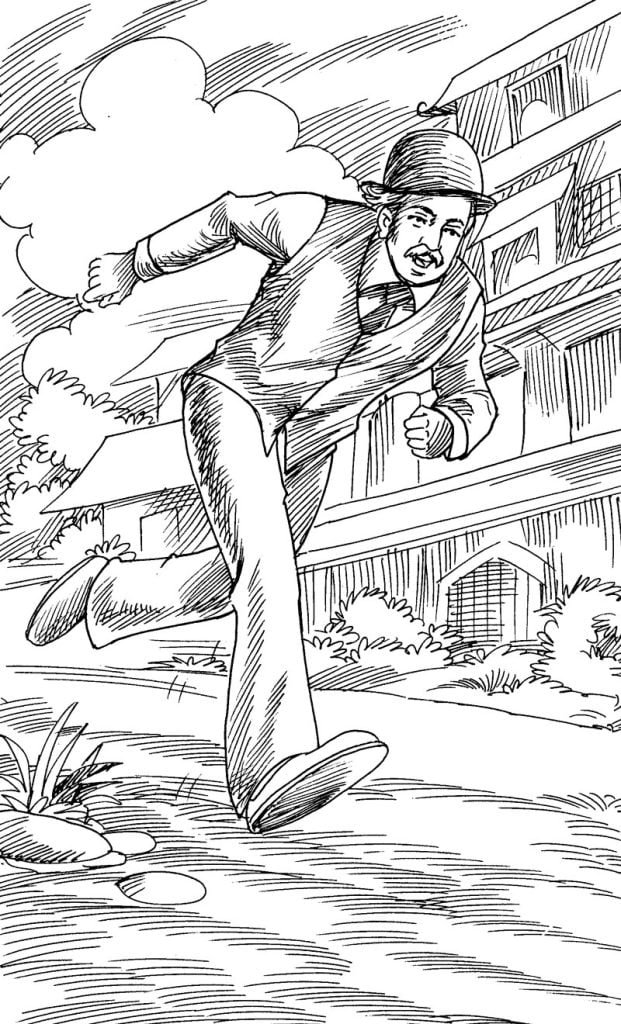Chapter 4
Phileas Fogg and Passepartout got off the steamer at 4:00. In four hours, the train would leave Bombay, on the west coast of India, for Calcutta, in the northeast.
Caring nothing for the sights of India, Fogg went directly to the consulate for a visa and then to the railroad station for dinner. Detective Fix went to the police station, but the arrest warrant for the bank robber had not arrived.

Passepartout bought shirts and socks for his master. Then he wandered into a beautiful Indian temple, or pagoda. He didn’t know that visitors were supposed to leave their shoes at the entrance of pagodas. No sooner had he entered the building than three Indian priests knocked him down, tore off his shoes, and beat him with their fists. Passepartout, leaped to his feet, knocked over two of his attackers, and fled to escape the third.
At five minutes before 8:00, the servant, shoeless, dashed into the railroad station and told Phileas Fogg what had happened. Fix, hiding near by, overheard the conversation.
‘Ah!’ thought the detective, ‘Passepartout has committed a crime in India, That should make it easier for me to arrest his master. Fogg must he held responsible for his servant’s actions.’
As the train left the station, Phileas Fogg noticed that Sir Francis Cromarty, one of his whist partners from the steamer Mongolia, was aboard. Sir Francis, an English army officer, spent most of his time in India and knew the country as well as any Indian. Fogg, however, wasn’t interested in learning more about India. He was too busy figuring out how many days and hours of his around-the-world trip had gone by.
“See those mountains?”said Sir. Francis, “A few years ago, we would have met such a long delay here that you would have lost your bet. The railroad used to stop here, and the passengers would have to cross the mountains on horses.”
“That wouldn’t have ruined my travel plans at all,” snapped Phileas Fogg, “I knew there would be certain problems.”
“Indeed, you may still run into trouble over your servant’s behaviour at the pagoda. The government protects Indian religions and customs very strictly.”
At 8:00 the train stopped, and the conductor ordered all the passengers to get off. They were in the middle of a forest!
“Where are we?” asked Phileas Fogg.
“At the village of Kholby,” replied the conductor.
“The railroad isn’t finished. There is no track between here and Allahabad, a distance of 50 miles.”
“But the newspapers said the railroad turns all through India now,” Fogg protested.
“The papers made a mistake.”
“Why, then, do you sell tickets from Bombay to Calcutta?”
“With the understanding that passengers will find their own way of getting from Kholby to Allahabad.”
“This is a terrible delay for you, Mr. Fogg,” said Sir Francis.
“It’s okay. I’m two days ahead of schedule. Today is October 22. A steamer leaves Calcutta for Hong Kong on October 25. We will reach Calcutta by then.”
Fogg saw a man with an elephant and decided to buy it at any cost for the trip to Calcutta. The owner didn’t want to sell the animal but finally accepted 2,000 pounds. Fogg then hired a young man from the Parsee caste, or class, of India to serve as an elephant driver and guide.
Phileas Fogg and Sir Francis sat on the elephant’s neck; Passepartout sat on his back. They passed through an area peopled by fierce tribes with savage customs. Suddenly, the elephant stopped. Loud voices came through the trees.
A procession of Brahmins is heading this way,” said the Parsee, “Let’s hide!” The Brahmins are the priests of the Indian religion of Hinduism.
Soon the priests came into view, followed by a large crowd of people chanting mantras. Carried along on a platform was a statue of the Hindu goddess Kali, with four arms and a red body. The Brahmins also dragged along a young woman dressed in a beautiful robe and jewellery. She had very light skin and looked more like a European than an Indian. Behind her came men holding sabers and guns, and carrying the body of an old man dressed like a Hindu prince. The Parsee explained that the body was that of the young woman’s husband, who was an Indian rajah, or prince.
“The woman will be taken to a pagoda to spend the night,” said the Parsee, “Tomorrow at dawn, she will be burnt alive as a human sacrifice to the gods!”
“I have 12 hours to spare,” cried out Phileas Fogg, “Let us stop and save this woman!”

